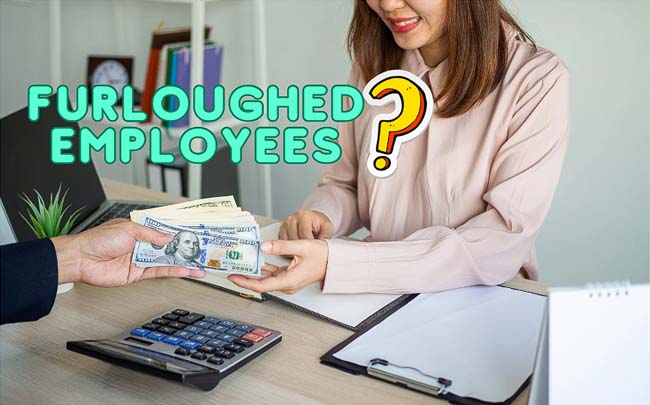Being temporarily laid off from your job could happen at any time, especially during shutdown furloughs.
When you’re in “furloughs,” it means something happened to your company. And it usually relates to deviations in annual allocations, usually at the beginning of the fiscal year, where the funds allocated for that year are not available.

Sure, one thing that worries those who are in furloughs is whether or not their employers will pay them. Until now, this has been a hot topic among furloughed employees. You’re great to be here, since we’ll reveal the facts about it for you. Check it out!
What is a Furlough?
A furlough refers to the temporary layoff of an employee from work, an involuntary leave, or some changes or even deductions from normal working hours.
There are a few reasons why furloughs happen, including:
-
- Lack of work or funds
- Factory closures
- Major reorganizations that make it hard for the company to determine which employees will be kicked out
- Other non-disciplinary reasons
Furloughs can also occur in the military, where members are allowed to leave their posts for a predetermined period of time or when new assignments have not been determined.
Employers benefit from furloughs over layoffs since they can call back workers who have been trained when the company’s financial condition begins to improve. This would be better than recruiting and training new workers.
So far, a furlough is an effective solution when a difficult situation occurs in the company or when an unpredictable thing occurs, like the pandemic of COVID-19. Instead of laying off the employees permanently, it would be more humane if they were temporarily laid off.
When Can Companies Carry Out Furloughs to Their Employees?
Furloughs do not happen immediately, but there are certain considerations where employers must ultimately take steps to furlough their employees.
Usually, the employees can carry out furloughs if:
1. An economic crisis occurred
Companies experiencing a crisis will definitely reduce operational costs, including paying their employees. Some may impose a certain number of mandatory unpaid holidays each week, month, or year.
To reduce paid leave time, employers may provide longer leave for certain holidays, such as Christmas and New Year. That way, they don’t have to pay benefits for additional vacation days.
2. Seasonal conditions
For companies that operate during certain seasons, for example, landscaping and lawn care services, they can furlough their employees during the winter due to a shortage of raw materials. If summer arrives, they can call employees back to start operations. During furloughs, employers don’t have to pay for them, right?
3. Shutdown furloughs
A shutdown furlough usually occurs when there are irregularities in annual allocations and/or the company does not provide sufficient funds during the fiscal year to pay their employees.
In the United States, government agencies must suspend activities until the legislature decides to release the funds. During the shutdown furlough period, affected institutions and companies must close all activities of any kind if such operations are funded by annual appropriations that are not exempt by law.
While employees are on shutdown furloughs, they are not permitted to volunteer for unpaid work unless otherwise permitted by law. This is because an institution or company may not accept voluntary services from an employee during shutdown furloughs.
Will Furloughed Employees Get Paid?
It will depend on what type of employee you are.
-
If you are a non-exempt employee
A non-exempt employee is a type of worker who usually gets paid an hourly wage and earns a salary that is less than the minimum amount, as the Department of Labor has determined. But they are entitled to the federal minimum wage and qualify for overtime pay.
Non-exempt employees will usually be furloughed by reducing their working hours in a week, and they will still be paid for their reduced working hours.
If you are paid an hourly wage and your working hours are reduced, your employer will pay you according to the hours you work.
-
If you are an exempt employee
An exempt employee is a type of worker who is exempt from minimum wage and overtime pay requirements. This is because they earn a salary, not an hourly wage, and their work is considered professional. This category of employees has been defined in the Fair Labor Standards Act (FLSA).
If you are paid a predetermined weekly or monthly salary, you are not paid if you’re furloughed. If you do any work, you must be paid your full salary, with certain exceptions.
If you work in health and safety services, national security, emergency response, and similar responsibilities, you will continue to work without pay for the time being, but you are guaranteed to be paid at the end of the closure period.
To note:
If you’re furloughed due to a shutdown because there are irregularities in your company’s allocated funds, you’ll surely be temporarily laid off from duty and not paid. The good news is that you’ll receive retroactive pay, and it will be provided at the earliest possible date after the furlough ends.
The rule is contained in 31 U.S.C. 1341(c)(2). https://www.law.cornell.edu/uscode/text/31/1341
What is retroactive pay? It refers to a salary payment method to compensate employees for the work they have done. This is awarded based on the employee’s standard pay rate. These retroactive payments will be provided as soon as possible if they cannot be provided by the normal payment date for a particular payment period.
May You Take Other Jobs While on Furlough?
It actually makes sense when you’re looking for a new job while on furlough.
However, there is no guarantee that furloughed employees will be rehired, especially when your employer notifies you that you have been laid off indefinitely. After all, your household needs cannot be postponed.
There’s no doubt that the best time to search for a new job is when you already have one. The kinds of jobs you can apply for are actually free—the jobs could be full-time, part-time, on payroll, or on contract.
But if you’re on furlough, the company may restrict the types of new jobs you’re looking for. Your employers may prohibit you from working for their direct competitor.
If you get a new job, you must report your weekly earnings as you certify your unemployment benefits. If you don’t conduct it, this will be considered unemployment insurance fraud.
Failure to do so has consequences that vary by state. Additionally, consequences can include having to pay penalty fees, repaying benefits plus interest, being ineligible for future benefits, and even criminal prosecution.
In several states, you’re allowed to obtain a certain percentage of your benefit through your other work before your payment is reduced.
You need to know that the number of hours or days you work can also lower your benefit amount or even potentially make you ineligible completely.
Conclusion
An employee will be paid during furloughs if the person is a non-exempt employee who is paid an hourly wage. That means they’ll only be paid in accordance with the number of hours they work. When they’re on furlough, their working hours will actually be reduced, and their wages will be reduced as well.
A furloughed employee will not be paid if they’re an exempt employee who has a predetermined salary on a weekly or monthly basis. However, their employment benefits, like health insurance, will still be provided. And if they work during furlough, their employers must pay them their full weekly or monthly salary.

A bookworm and researcher especially related to law and citizenship education. I spend time every day in front of the internet and the campus library.

